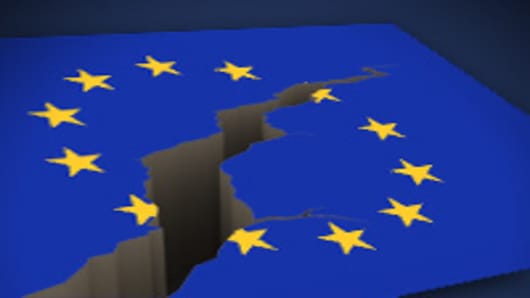Recently, European leaders gathered in Brussels for an “informal summit.” Afterwards, Euro dropped sharply as fears took toll.
After a series of political shifts in Europe, the old plans are history, but new plans are missing.
Amidst a historical five-year contraction, Greeks will be heading to the polls again in mid-June. Meanwhile, finance ministers in the Eurozone are smiling optimistically but preparing contingency plans for the Greek exit.
With the onset of the Euro crisis in spring 2010, it was clear that the Greek challenges could not be resolved without debt restructuring.
In May 2010, the Eurozone supported Greece with €110 billion; last year Athens hoped to stay afloat with another bailout round of €109 billion.
Neither will suffice.
Actually, the endgame began in October 2011, when the Troika - European Commission, European Central Bank and the IMF - concluded in its debt sustainability study that Greece will need another €250 billion in the next decade.
Altogether, Greece will absorb more than half a trillion euros ($610bn) in a decade. The best it can hope is to have a debt-to-GDP ratio of more than 120% in 2021 – a level that got Italy into trouble last fall.
Political earthquakes
After recent elections, the Eurozone endgame is shifting.
In Greece, Brussels first negotiated with the PASOK socialists. After they were voted out came the turn of the conservative New Democracy. After the June 17 elections, the Radical Left Coalition and its eloquent spokesman Alexis Tsipras will be poised to lead.
Tsipras is against austerity, but would like to stay in the Eurozone. But you can’t have your cake and eat it, too.
The most important elections took place in France. As President Nicolas Sarkozy and his conservatives are out, Francois Hollandeand his socialists are in.
During his campaign, Hollande spoke for a growth pact, as opposed to austerity. After the elections, he is more diplomatic. Growth is needed, but it can be included as a new dimension in the Eurozone growth compact.
In the campaign trail, Hollande also promoted the idea of the Euro bonds. In the long-term, most Eurozone members will accept them. In the short-term, Chancellor Merkel has signaled that she can live with “project bonds,” which allow infrastructure investments.
How will Holland achieve growth with austerity? Nobody knows. Two hints, though. First, he will avoid any specifics until the French elections. He needs parliamentary majority to have effective change.
Second, Hollande’s idol, former socialist president François Mitterrand (1981-95), sustained French welfare system by tripling the level of debt. Hollande hopes to achieve the same goal, but he might prefer inflation.
In Germany, Chancellor Angela Merkel’s positionremains strong federally, but her Christian-Democratic CDU has been hit left and right at the state elections.
In Italy, President Berlusconi is out, and Mario Monti’stechnocratic regime is in. Like Merkel, Monti sees austerity measures as necessary. But like Hollande, he supports Euro bonds.
In Spain, Prime Minister Mariana Rajoy is behind Merkel. But with unemployment more than 20% and youth unemployment exceeding 50%, Rajoy is living on borrowed time.
Along with the Germans, the Dutch government has promoted austerity policies. But in the last election, it fell from grace.
In the past two years, political leadership in Europe has shifted from Brussels to inter-governmental decision-making among the major Eurozone member states – read: Germany and France.
As Merkel support is softening at the state level and as Hollande has taken over the Elysee Palace, the old Eurozone policy is history and there is no consensus on the new one.
Growth without growth
Since nothing new can be done in the Eurozone until after the Greek and French elections, there will be much talk about growth that will not take place.
Growth. The European leaders say they will invest “tens of billions of euros” in the region. Translation: Due to bureaucracy, the EU has some €80 billion unused funding, which can be repurposed.
Bonds. The European Commission will start issuing project bonds designed to support private investors on infrastructure projects, perhaps €5 billion by 2014.
Stimulus. European Investment Bank’s capital will be increased, perhaps by €10 billion. But not every country is committed to financing the investment.
Any other lofty goals – including efforts to battle youth unemployment, continued structural reforms, or financial transaction taxes – are likely to divide as much as to unite.
Well-intended but ineffective Eurozone policies could alleviate some of the pain. But the proposed efforts amount at most to €100 billion in the next two years, whereas Italy’s government debt alone already exceeds €2 trillion.
The Greek exit
With great debate, the Eurozone will slowly but surely move to the next stage – the Greek exit – in the coming months.
The question is not whether it will happen. The question is whether it will be orderly or disorderly.
Only political facilitation can ensure an orderly Greek exit. In practice, it is predicated on economic support by the European Commission, European Central Bank, and the IMF, as well as the largest Eurozone economies.
If the Greek exit is disorderly, contagion effects will be difficult to contain.
In the past, the problems of the Eurozone could be defused as long as the problem countries (Greece, Ireland, Portugal) were each less than 3% of the total Eurozone GDP.
Together, Italy and Spain account for almost 30% of the Eurozone GDP. No liquidity in the Eurozone is sufficient to contain these too-big-to-fail economies.
The Eurozone endgame has begun.
Dan Steinbock is research director of International Business at India China and America Institute (USA), visiting fellow at Shanghai Institutes for International Studies (China) and in the EU-Center (Singapore).


